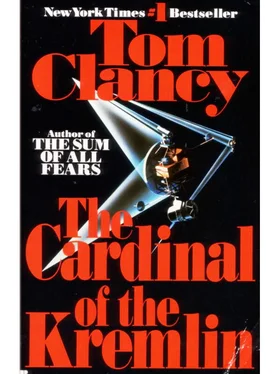Tom Clancy - The Cardinal of the Kremlin
Здесь есть возможность читать онлайн «Tom Clancy - The Cardinal of the Kremlin» весь текст электронной книги совершенно бесплатно (целиком полную версию без сокращений). В некоторых случаях можно слушать аудио, скачать через торрент в формате fb2 и присутствует краткое содержание. Год выпуска: 1988, Жанр: Триллер, на английском языке. Описание произведения, (предисловие) а так же отзывы посетителей доступны на портале библиотеки ЛибКат.
- Название:The Cardinal of the Kremlin
- Автор:
- Жанр:
- Год:1988
- ISBN:нет данных
- Рейтинг книги:3 / 5. Голосов: 1
-
Избранное:Добавить в избранное
- Отзывы:
-
Ваша оценка:
- 60
- 1
- 2
- 3
- 4
- 5
The Cardinal of the Kremlin: краткое содержание, описание и аннотация
Предлагаем к чтению аннотацию, описание, краткое содержание или предисловие (зависит от того, что написал сам автор книги «The Cardinal of the Kremlin»). Если вы не нашли необходимую информацию о книге — напишите в комментариях, мы постараемся отыскать её.
The Cardinal of the Kremlin — читать онлайн бесплатно полную книгу (весь текст) целиком
Ниже представлен текст книги, разбитый по страницам. Система сохранения места последней прочитанной страницы, позволяет с удобством читать онлайн бесплатно книгу «The Cardinal of the Kremlin», без необходимости каждый раз заново искать на чём Вы остановились. Поставьте закладку, и сможете в любой момент перейти на страницу, на которой закончили чтение.
Интервал:
Закладка:
"Where is my man!" Yazov demanded.
"He is in Lefortovo Prison, of course," Gerasimov answered.
"I want to see him. At once." The Defense Minister hadn’t even paused to take off his cap, standing there in his calf-length greatcoat, his cheeks still pink from the chilly February air – or perhaps with anger, Gerasimov thought. Maybe even with fear…
"This is not a place to make demands, Dmitri Timofeyevich. I, too, am a Politburo member. I, too, sit on the Defense Council. And it may be that you are implicated in this investigation." Gerasimov's fingers played with a file on the desktop.
That changed Yazov's complexion. He went pale, definitely not from fear. Gerasimov was surprised that the soldier didn't lose control, but the Marshal made a supreme effort and spoke as though to a new draftee:
"Show me your evidence here and now if you have the balls for it!"
"Very well." The KGB Chairman flipped open the folder and removed a series of photographs, handing them over.
"You had me under surveillance?"
"No, we've been watching Filitov. You just happened to be there."
Yazov tossed the prints back with contempt. "So what? Misha was invited to a hockey game. I accompanied him. It was a good game. There is an American boy on the team – I met the mother at some reception or other – oh, yes, it was in George Hall when the American negotiators were last over. She was at this game, and we said hello. She is an amusing woman, in an empty-headed sort of way. The next morning I filled out a contact report. So did Misha."
"If she is so empty-headed, why did you bother?" Gerasimov inquired.
"Because she is an American, and her husband is a diplomat of some kind or other, and I was foolish enough to allow her to touch me, as you see. The contact report is on file. I will send you a copy of mine, and Colonel Filitov's." Yazov was speaking with more confidence now. Gerasimov had miscalculated somewhat.
"She is an agent of the American CIA."
"Then I am confident that Socialism will prevail, Nikolay Borissovich. I didn't think that you employed such fools – not until today, that is."
Defense Minister Yazov allowed himself to calm down. Though new to the Moscow scene – until very recently he'd been commander of the Far East Military District, where Narmonov had spotted him – he knew what the real struggle here was all about. He did not, could not believe that Filitov was a traitor – did not believe because of the man's record; could not believe because the scandal would destroy one of the most carefully planned careers in the Soviet Army. His.
"If you have real evidence against my man, I want my own security people to review it. You, Nikolay Borissovich, are playing a political game with my Ministry. I will not have KGB interference in the way I run my Army. Someone from GRU will be here this afternoon. You will cooperate with him or I will take this to the Politburo myself."
Gerasimov showed no reaction at all as the Defense Minister left the room, but realized that he'd made an error of his own. He'd overplayed his hand – no, he told himself, you played it a day too soon. You expected Yazov to collapse, to bend to the pressure, to accept a proposal not yet made.
And all because that fool Vatutin hadn't gotten positive evidence. Why couldn't he have waited one more second!
Well, the only thing to do is to get a full confession from Filitov.
Colin McClintock's official job was in the commercial office at Her Britannic Majesty's Embassy, just across the Moscow River from the Kremlin, a location that predated the revolution and had annoyed the Soviet leadership since Stalin's time. But he, too, was a player in the Great Game. He was, in fact, the case officer who "ran" Svetlana Vaneyeva and had seconded her to the CIA for a purpose which had never been explained, but the orders for which had come direct from London's Century House, the headquarters of the SIS. At the moment, he was taking a group of British businessmen through GOSPLAN, introducing them to some of the bureaucrats with whom they'd have to negotiate the contracts for whatever they hoped to sell to the local barbarians, McClintock thought. An "Islander" from Whalsay off the Scottish coast, he regarded anyone from south of Aberdeen as a barbarian, but worked for the Secret Intelligence Service anyway. When he spoke in English, he used a lilting accent laced with words spoken only in Northern Scotland, and his Russian was barely comprehensible, but he was a man who could turn accents on and off as though with a switch. And his ears had no accent at all. People invariably think that a person who has trouble speaking a language also has trouble hearing it. It was an impression that McClintock assiduously cultivated.
He'd met Svetlana this way, had reported her to London as a possible target for recruitment, and a senior SIS officer had done just that in the second-floor dining room of Langan's Brasserie on Stratton Street. Since then McClintock had seen her only on business, only with other British subjects and Russians around. Other SIS officers in Moscow handled her dead-drops, though he was actually responsible for her operations. The data that she'd gotten out was disappointing but occasionally useful in a commercial sense. With intelligence agents you tended to take what you got, and she did forward insider gossip that she picked up from her father.
But something had gone wrong with Svetlana Vaneyeva. She'd disappeared from her desk, then returned, probably after interrogation at Lefortovo, the CIA had said. That made little sense to McClintock. Once they got you into Lefortovo, they had you for more than a day or two. Something very strange had happened, and he'd waited for a week to figure a way to find out exactly what it might have been. Her drops were untouched now, of course. Nobody from SIS would ever go near them except to see if they'd been disturbed, from a discreet distance.
Now, however, he had his chance, taking his trade delegation across the room that held the textile section of the planning agency. She looked up and saw the foreigners walking by. McClintock gave the routine interrogation signal. He didn't know which reply he'd get, nor what the reply would really mean. He had to assume that she'd been broken, totally compromised, but she had to react some way. He gave the signal, a brush of his hands against his hair as natural as breathing, as all such signals were. Her reply was to open a desk drawer and extract either a pencil or a pen. The former was the "all clear" signal, the latter a warning. She did neither, and merely returned to the document she was reading. It almost surprised the young intelligence officer enough to stare, but he remembered who and where he was, and turned away, scanning other faces in the room as his hands fluttered nervously about, doing various things that could have meant anything to whoever was watching.
What stuck in his mind was the look on her face. What had once been animated was now blank. What had once been lively was now as emotionless as any face on a Moscow street. The person who'd once been the privileged daughter of a very senior Party man was different now. It wasn't an act. He was sure of it; she didn't have the skill for that.
They got to her, McClintock told himself. They got to her and let her go. He didn't have a clue why they'd let her go, but that wasn't his concern. An hour later he drove the businessmen back to their hotel and returned to his office. The report he dashed off to London was only three pages long. He had no idea of the firestorm it would ignite. Nor did he know that another SIS officer had sent another report the same day, in the same pouch.
"Hello, Arthur," the voice on the phone said.
" 'Morning – excuse me, good afternoon, Basil. How's the weather in London?"
Читать дальшеИнтервал:
Закладка:
Похожие книги на «The Cardinal of the Kremlin»
Представляем Вашему вниманию похожие книги на «The Cardinal of the Kremlin» списком для выбора. Мы отобрали схожую по названию и смыслу литературу в надежде предоставить читателям больше вариантов отыскать новые, интересные, ещё непрочитанные произведения.
Обсуждение, отзывы о книге «The Cardinal of the Kremlin» и просто собственные мнения читателей. Оставьте ваши комментарии, напишите, что Вы думаете о произведении, его смысле или главных героях. Укажите что конкретно понравилось, а что нет, и почему Вы так считаете.






![Александр Ирвин - Tom Clancy’s The Division 2. Фальшивый рассвет [litres]](/books/417744/aleksandr-irvin-tom-clancy-s-the-division-2-falsh-thumb.webp)





